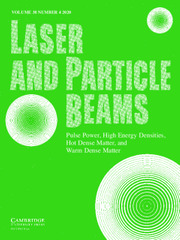Article contents
Laser-driven acceleration of heavy ions at ultra-relativistic laser intensity
Published online by Cambridge University Press: 24 January 2019
Abstract
This paper presents the results of numerical investigations into the acceleration of heavy ions by a multi-PW laser pulse of ultra-relativistic intensity, to be available with the Extreme Light Infrastructure lasers currently being built in Europe. In the numerical simulations, performed with the use of a multi-dimensional (2D3V) particle-in-cell code, the thorium target with a thickness of 50 or 200 nm was irradiated by a circularly polarized 20 fs laser pulse with an energy of ~150 J and an intensity of 1023 W/cm2. It was found that the detailed run of the ion acceleration process depends on the target thickness, though in both considered cases the radiation pressure acceleration (RPA) stage of ion acceleration is followed by a sheath acceleration stage, with a significant role in the post-RPA stage being played by the ballistic movement of ions. This hybrid acceleration mechanism leads to the production of an ultra-short (sub-picosecond) multi-GeV ion beam with a wide energy spectrum and an extremely high intensity (>1021 W/cm2) and ion fluence (>1017 cm−2). Heavy ion beams of such extreme parameters are hardly achievable in conventional RF-driven ion accelerators, so they could open the avenues to new areas of research in nuclear and high energy density physics, and possibly in other scientific domains.
Information
- Type
- Research Article
- Information
- Copyright
- Copyright © Cambridge University Press 2019
References
- 13
- Cited by

